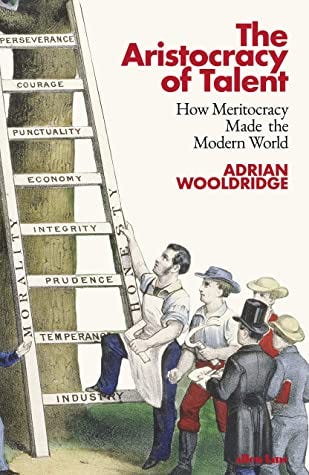
Discover more from Holodoxa
A History of Meritocracy
Review of Adrian Wooldridge's The Aristocracy of Talent: How Meritocracy Made the Modern World
Aristocracy, from the Greek αριστοκρατία, means “rule by the best.” Although, the term now connotes elitism and suggests the hereditary transmission of privilege, “Rule by the best” sounds like a reasonable idea. That is, as long as what’s best is of material benefit to the rest of society. But how do we get there? One word: meritocracy.
Meritocracy is the idea that a political system should distribute social and economic advancement according to relative differences in talent, skill and effort rather than kinship or power. This principle is foundational to many contemporary civilizations, especially advanced ones, from Western-style liberal democracies like the United States to state-capitalistic regimes like China. Meritocracies depend heavily on social sorting mechanisms like standardized testing to identify raw talent from across social strata and universal education to help cultivate that raw talent. In theory, this approach should optimize social mobility, increase economic productivity, and match talents and interest better than any other system. It strikes a rare balance between liberty, equality, and prosperity. Of course, the model is always simpler than reality, and meritocracy has been the subject of intense scrutiny and criticism, especially from the elite American progressives.
To understand this interesting state of affairs, it is worth examining the history of meritocracy, and its contemporary status. To do this I turned to the latest work of Adrian Wooldridge (1959-). Wooldridge currently serves as the global business columnist at Bloomberg Opinion and previously wrote for The Economist. He has also written several books, and his latest The Aristocracy of Talent: How Meritocracy Made the Modern World (2021), is the first general history of meritocracy.
The Aristocracy of Talent
Wooldridge bills The Aristocracy of Talent as a comprehensive general history of meritocracy. He asserts that meritocracy is both a new and revolutionary idea relative to typical or default human social arrangements, which tend to favor kinship ties (nepotism) or waste talent in horrific ways (slavery, discrimination, etc). His book also doubles as a robust defense of meritocracy. However, Wooldridge’s pro-meritocracy thesis is mostly implicit. He largely let's the historical record speak for itself. Wooldridge reserves his few unvarnished salvos for the meritocracy for the concluding portion of the book.
This stance on meritocracy sits in stark contrast to much of elite discourse on the subject. These conversations are typically characterized by polemical denunciations of meritocracy. The first objection is that the meritocracy is a mirage erected by the wealthy and powerful to maintain the status quo (more defensible versions of this just contend that elements of the meritocracy on inherently unfair or corrupted). And the second objection is that even if meritocracy was perfected it generates intolerable inequality and traps people in a soul-destroying rat race. Ironically (or not ironically depending on how cynically you view things), many of these vicious attacks on the meritocracy come from those who have already made it to the top of the proverbial greasy poll themselves: Michael Sandel (Harvard), Daniel Markovits (Yale), and Ibram X. Kendi (Guggenheim Fellow). Interestingly, neither political aisle alone wholly owns the attacks on the meritocracy. Most of the attacks do emerge from the elite and activist Left, but the Right also participates in the perpetual flogging. However, the right-wing critics of meritocracy exist on the margins on right-wing thought. They’re an assorted group of dissidents with more scientific and materialist perspectives, which simply isn’t representative of modal rank-and-file or elite conservatives. Contrastingly, the progressive critique animates much of the political agenda of both rank-and-file and elite Democract, e.g. expansion of social transfers and the support state.
Wooldridge's awareness of and sensitivity to the rhetorical critiques of meritocracy have certainly guided the presentation of his argument in The Aristocracy of Talent. There are simply clear tells of this. For instance, Wooldridge generally engages directly with the critiques from the Left, counter-arguing that more meritocracy is actually a solution to issues of inequality and injustice. He maintains that meritocracy is revolutionary, allowing both upward and downward mobility and improving absolute outcomes, and thus should be amenable to progressive goals. I’m sure this response is unsatisfying to those progressives though. Contrastingly, he provides the perfunctory inaccurate disputation of Richard Herrnstein and Charles Murray's Bell Curve thesis. The Bell Curve described the rise and entrenchment of a cognitive elite in American society. It argued this cognitive elite would grow increasingly walled off from mainstream Americans in ways that would cause political and social dysfunction (hence Murray’s Coming Apart follow-up in 2016). Murray’s arguments are in large part representative the Right's materialist and empirical critique of meritocracy. Because Wooldridge misinterprets or mischaracterizes the various objections to meritocracy a bit, he doesn’t really address them satisfactorily. Nonetheless, The Aristocracy of Talent is the rare, anachronistic Right-leaning liberal defense of meritocracy. Wooldridge is definitive that meritocracy is the best worst option available, the best sorting mechanism and incentive structure for human capital in a market economy. It is also somewhat uncommon to find a consistently sober character taking such a position. Usually, a bomb-throwing talking head or a wry provocateur is making these points, which does little to help meritocracy’s case in public discourse. Even many of the accomplished politicians of the past, Maggie Thatcher and Ronald Reagan, who shared Wooldridge's perspective, had a flair for the dramatic, though their approach was much more persuasive to American’s than the harsher Ayn Rand inflected defenses today.
What actually is the meritocracy?
According to Wooldridge meritocracies combines four qualities: 1) generous material incentives for in-demand natural talents cultivate via hard work and strategic choices 2) institutions that promote equal opportunity, specifically universal education 3) minimal discrimination on superficial traits, i.e. those without social or economic value 4) unbiased filtering mechanisms that maintain open competition, i.e. those that minimize patronage and nepotism. Wooldridge points out that many of these principles were described by Plato, who even tried to establish a school to train the philosopher kings to lead Greek society. However, meritocratic institutions didn’t actually start to make an impact until after the Enlightenment and Scientific Revolution. The push for these meritocratic reforms came from the bottom-up. Aspiring members of Western countries pushed their landed aristocracies to democratize education and political participation and liberalize economic activity. Wooldridge argues the increase in meritocratic opportunities over time enabled by these reforms and many others forged the modern world by unleashing human potential and creating a more dynamic and fairer society.
Wooldridge’s offers a tripartitie history of meritocracy as part of its defense, including a tour how coarse and unjust alternative social arrangement are. The first part describes the origins and rise of meritocracy from Plato’s The Republic to ancient China to the European Enlightenment. Wooldridge examines how different civilizations and cultures developed various systems of selecting and rewarding talent and skill; systems that departed from more primitive models of rewards based on birth or wealth. The second part covers the triumph and transformation of meritocracy in the modern world, focusing on how the Industrial Revolution, the expansion of education, the rise of democracy, and the emergence of psychology and testing shaped the meritocratic ideal and practice in different countries and regions. Wooldridge is a staunch proponent of scholastic achievement/intelligence and domain-specific knowledge testing. The third part addresses the contemporary crisis of meritocracy in the twenty-first century, analyzing the challenges and criticisms: populism, identity politics, inequality, and corruption (nepotism and patronage). Wooldridge concludes The Aristocracy of Talent with some proposed reforms. These mostly concern improved sorting and talent acquisition mechanisms like testing.
As an aside, the word meritocracy of course emerged as an epithet for the idea it describes (“capitalism” has the same story). Michael Young's sociological satire The Rise of the Meritocracy (1958) sought to displace the idea that IQ + Effort = Merit. He tried to cast the burgeoning meritocracy as a dystopia on the scale of 1984 or A Brave New World. But despite Young's ire, meritocracy was adopted explicitly and cautiously championed by the mainstream for most the latter half of the 20th century. Post-2008, the winds changed significantly. We've now reached a point, where many of the most elite universities in America no longer require standardized test scores to be submitted with an application, and it is considered exceedingly gauche among polite society to endorse the idea that talent and hard work should be significantly rewarded.
An Imperfect Meritocracy
Wooldridge's does concede that our modern meritocracy has many faults. He even calls it a “pluto-meritocracy,” where contemporary affluent families have been able to hoard material and social cache and transmit it efficiently to their offspring without regard to whether or not those offspring have proved deserving of those spoils. He highlights how this is mostly mediated by access to and manipulation of top educational institutions. He also points out this issue can be resolved by more meritocracy, not less. Simple reforms to testing and admission standards can loosen up this calcification. Wooldridge’s criticism of pluto-meritocracy echoes Richard Reeves' Dream Hoarders thesis. However, I think this thesis significantly underestimates the impact of affinity-based migration patterns, assortative mating, and hereditary advantages and overestimates regression to the mean effects on socially valuable traits. To address these concern Wooldridge would've needed to engage more directly with the findings of economic historian like Gregory Clark and behavioral geneticists like Robert Plomin and Paige Harden.
Additionally, I think Wooldridge’s arguments need a more solid empirical grounding. He relies too heavily on moral and philosophical appeals, ignoring much of what we have learn from quantitative study of the phenomena in question. There are certain facts that simply cut against his vision of meritocracy: power law distribution of spoils but a bell curve of talent, low historical rate social mobility, high historical rate of assortative mating, and biogeographical inequality. In fact, I think his case for meritocracy would be stronger if he incorporated these ideas. Some of the complaints about meritocracy are actually deeper complaints about the course of human history and human nature. The best defense of meritocracy is simply that it maximizes economic efficiency and productivity and that society as a whole benefits from the subsequent material growth. Wooldridge makes this point but fails to develop it, focusing instead on moral claims.
Regardless of its flaws, The Aristocracy of Talent is a must-read. It is easy to find garden variety critiques of meritocracy but hard to find thoughtful defenses that actually account for historical context. Meritocracy does deserve defense. It also simply isn't going to disappear. Much of the sorting that affect outcomes of interest occur simply because markets exist, and markets are deeply integrated. So I see meritocracy’s footing as quite a bit more solid than Wooldridge. I think it was the result of a historical and psychological revolution that cannot be easily walked back by rhetoric or even political action. I also think Wooldridge is a bit too optimistic about how evenly the spoils of meritocracy are distributed and the opportunities for social mobility. Progressives will always object to unequal outcomes. Wooldridge should have done more to explicitly point out the inevitability of inequality and social hierarchy to a progressive audience. We shouldn't toss meritocracy out even though its consequences are inegalitarian. This externality can be mitigated in a number of ways, which are generally accessible to democratic societies. I just hope we choose to use these tools judiciously. Unfortunately, this appears unlikely.
Additional Reading on Meritocracy, Social Stratification, Achievement Culture, and Natural Talent:
Coming Apart by Charles Murray
The Bell Curve: Intelligence and Class Structure in American Life by
Richard J. Herrnstein, Charles Murray
The Cult of Smart: How Our Broken Education System Perpetuates Social Injustice by Fredrik deBoer
Excellent Sheep: The Miseducation of the American Elite and the Way to a Meaningful Life by William Deresiewicz
The Rise of the Meritocracy by Michael Young
The Tyranny of Merit: What's Become of the Common Good? by Michael J. Sandel
The Meritocracy Trap: How America's Foundational Myth Feeds Inequality, Dismantles the Middle Class, and Devours the Elite by Daniel Markovits
Dream Hoarders: How the American Upper Middle Class Is Leaving Everyone Else in the Dust, Why That Is a Problem, and What to Do About It by Richard Reeves
The Genetic Lottery by Kathryn Paige Harden
The Son Also Rises & A Farewell to Alms by Gregory Clark
When Race Trumps Merit: How the Pursuit of Equity Sacrifices Excellence, Destroys Beauty, and Threatens Lives by Heather MacDonald
Discussions and Debates with Adrian Wooldridge:
Subscribe to Holodoxa
A study of the total human condition. I examine ideas from science, literature, technology, politics, and more. Most posts will consist of book reviews or short essays.
















"We shouldn't toss meritocracy out even though its consequences are inegalitarian. This externality can be mitigated in a number of ways, which are generally accessible to democratic societies."
How so? I have my own ideas (starting with a realistic floor for a basic living wage for all adults) but am curious about yours.
If meritocracy is the appropriate paradigm that encourages talent to succeed and to lead (despite various corruptions that game the meritocratic system, all of which can & should be improved), a framework that seems to be necessary for liberal societies to continue progressing & succeeding... what becomes of the less talented in a meritocratic society? Does Wooldridge address this?